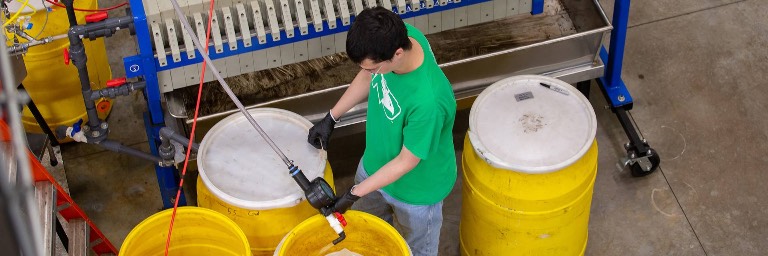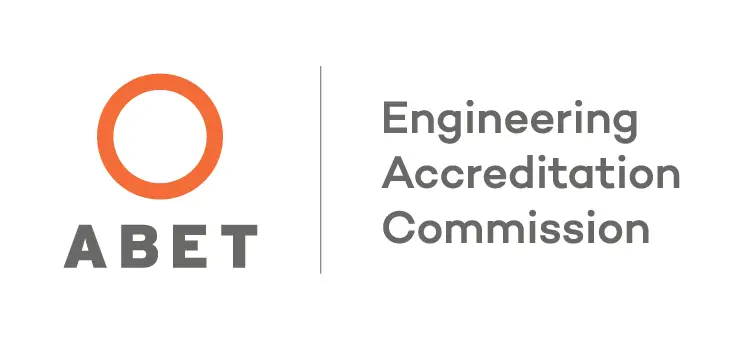Petroleum Engineering Degree
Tap into a field growing twice as fast as the national average.
UND's Petroleum Engineering program is the only one in North Dakota and was designed with industry input. Hands-on learning will give you the technical skills to recover oil and gas, and the insight to address industry challenges.
- Program type:
- Major
- Format:
- On Campus or Online
- Est. time to complete:
- 4+ years
- Credit hours:
- 129
Why pursue a Petroleum Engineering major?
Petroleum Engineering Major
-
Satisfy the eligibility requirement to sit for the NCEES Fundamentals of Engineering (FE) examination. Accredited by the Engineering Accreditation Commission of ABET, passing the FE exam is required as the first step to pursue a license as a Professional Engineer in all 50 states.
-
Tour oil fields around the world without leaving campus in the newly opened Hess Virtual Reality Lab.
-
Take a seat at the Drilling Systems Control Simulator. Learn how to manage day-to-day operations at oil and gas wells, or crisis situations, in complete safety.
-
Get a career-ready education thanks to UND's relationships with industry partners such as the American Petroleum Institute, North Dakota Petroleum Council and our own Industry Advisory Council.
-
Access the only core and sample library in North Dakota, which contains samples from three-quarters of the state's oil and coal reservoirs.
-
Conduct research on the world’s largest – and only - oil drilling simulator.
Petroleum Engineering Degree Courses
Online Petroleum Engineering Degree
UND is one of the most affordable online colleges in the region. For the online Petroleum Engineering bachelor's degree program, we offer the same online tuition rates regardless of your legal residency. Compare and you’ll see UND is lower cost than similar four-year doctoral universities.
Flexible Online Petroleum Engineering Classes
With asynchronous classes, you do not attend class at a set time. If you need to balance work, family and other commitments, this flexible format allows you to learn anywhere at any time.
Depending on your instructor, you’ll learn online through:
- Lesson modules
- Streaming video content
- Virtual libraries
- Posted lectures
- Online simulations
There will be times when you interact with your instructor and classmates through online discussion boards, polls and chat rooms.
Your learning revolves around materials that can be accessed on your own time within a set time frame. However, this is not a self-paced course. You’ll have structure and deadlines.
Campus Visit
While the majority of your Petroleum Engineering program is offered online, you’ll get to come to the UND campus in Grand Forks, ND to complete portions of the program. Your time on campus is designed to integrate, extend and apply the knowledge you’ve learned during your online courses. This time may include:
- Hands-on labs
- Simulators
- Opportunities to interact with faculty and other students
As a petroleum engineering student, your are required to attend two labs on-campus. Each lab is one week in length and you'll apply concepts that you've learned theoretically to enhance your understanding of the main concepts that will be reinforced throughout the program.
You also have the opportunity to use the two simulators and visit the North Dakota Geological Survey Wilson M. Laird Core and Sample Library.
The hands on experience necessary for petroleum engineering can only be gained on your campus visit, where you work over a short period of time with dedicated faculty and teaching assistants to build experience and master the job skills you need.
The Society of Distance Engineering Students is a club for online engineering students.
You'll have the chance to meet and work with students who study online and those who
attend classes on UND's campus. Even though you might be far apart, you can still
study and work together easily. The American Society of Mechanical Engineers (ASME) is a student organization that
brings in industry speakers, who are recorded and live, including aerospace scientists
and engineers. Other groups, such as the Advanced Rocketry Club, AIAA, etc. also bring
in speakers that can help you learn more about the industries and careers in Aerospace
Engineering. Engineering Clubs for Online Students
Top-Tier Petroleum Engineering Degree Online
Military Friendly® School
FAQs
The typical duration for earning a degree in petroleum engineering is four years for full-time students.
The demand for petroleum engineers remains consistent, with a projected 2% growth in employment from 2022 to 2032.
To become a petroleum engineer, a bachelor's degree in Petroleum Engineering is required. Alternatively, you may also consider pursuing a degree in a related field that provides a solid foundation for understanding the principles and practices of petroleum engineering, such as chemical engineering, geology, geological engineering, or mechanical engineering.
Absolutely. The energy industry is a key part of our nation and world’s economy. Without petroleum engineer’s to explore, produce, and process oil and gas, there would be severe limitations on chemical processing, transportation, and of course energy supplies. The Petroleum Engineering bachelor’s degree program offered here at UND consistently ranks among the Top 10 best online programs nationally, providing both affordable and quality education for over four decades.
There is no specific criteria to pursue a petroleum engineering degree, other than the admission requirements for the university. But students should be passionate about working in the oil and gas industry, as well as be motivated to learn science, chemistry, geology, and math to learn the required skills to be a successful engineer.
Leaders in Petroleum Engineering
The Petroleum Engineering program provides hands-on learning experience in a variety of disciplines.


